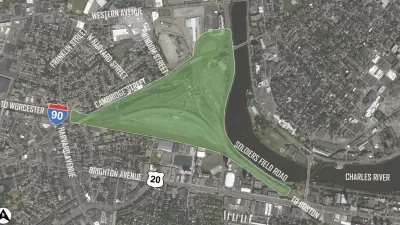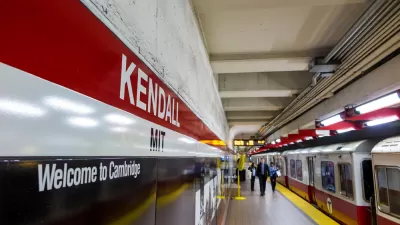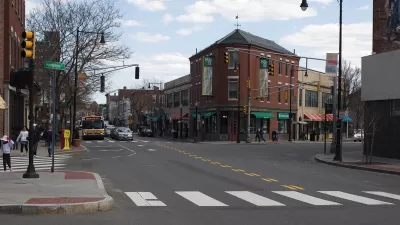Efforts to expand bicycle-friendly infrastructure across the country have revealed the importance of comprehensive planning. Peter DeMarco reports on ways in which planners in the Boston area are trying to fill in the gaps in their emerging network.
The Boston area has caught bike fever. With biking on the minds of politicians and residents throughout the region, DeMarco asks what it will take to transform Boston into a world-class bicycling region like Copenhagen.
Perhaps the largest barrier to creating more bicycle-travel incentives is a lack of comprehensive planning. Like our highways, mass transit systems, and even our pedestrian pathways, bicycle transit operates on a network, and for that system to operate efficiently, gaps and bottlenecks need to be eliminated. In the Boston region, "the area has a bicycling network that is hardly a network at all. Filled with interrupted paths and lanes and incomplete trails, it's a system of stops and starts." Bridging the gaps in Boston's system, like the nicely-named "Lost Half-Mile," could be "[t]he biggest boost to regional cycling."
DeMarco explains what it will take for Boston to become a bicycling mecca: "it will take more than just better infrastructure...We'll need workplaces that provide showers, developers to incorporate bike access from the street and storage racks into design plans, cooperation and respect between cyclists and motorists, police enforcement of cycling rules, bigger trail maintenance budgets, better signage, more cycling education programs, and a mental shift toward making bike trips, be they long or short, part of our daily lives."
FULL STORY: Biking to the future in Boston

Planetizen Federal Action Tracker
A weekly monitor of how Trump’s orders and actions are impacting planners and planning in America.

Restaurant Patios Were a Pandemic Win — Why Were They so Hard to Keep?
Social distancing requirements and changes in travel patterns prompted cities to pilot new uses for street and sidewalk space. Then it got complicated.

Map: Where Senate Republicans Want to Sell Your Public Lands
For public land advocates, the Senate Republicans’ proposal to sell millions of acres of public land in the West is “the biggest fight of their careers.”

Maui's Vacation Rental Debate Turns Ugly
Verbal attacks, misinformation campaigns and fistfights plague a high-stakes debate to convert thousands of vacation rentals into long-term housing.

San Francisco Suspends Traffic Calming Amidst Record Deaths
Citing “a challenging fiscal landscape,” the city will cease the program on the heels of 42 traffic deaths, including 24 pedestrians.

California Homeless Arrests, Citations Spike After Ruling
An investigation reveals that anti-homeless actions increased up to 500% after Grants Pass v. Johnson — even in cities claiming no policy change.
Urban Design for Planners 1: Software Tools
This six-course series explores essential urban design concepts using open source software and equips planners with the tools they need to participate fully in the urban design process.
Planning for Universal Design
Learn the tools for implementing Universal Design in planning regulations.
Heyer Gruel & Associates PA
JM Goldson LLC
Custer County Colorado
City of Camden Redevelopment Agency
City of Astoria
Transportation Research & Education Center (TREC) at Portland State University
Camden Redevelopment Agency
City of Claremont
Municipality of Princeton (NJ)





























